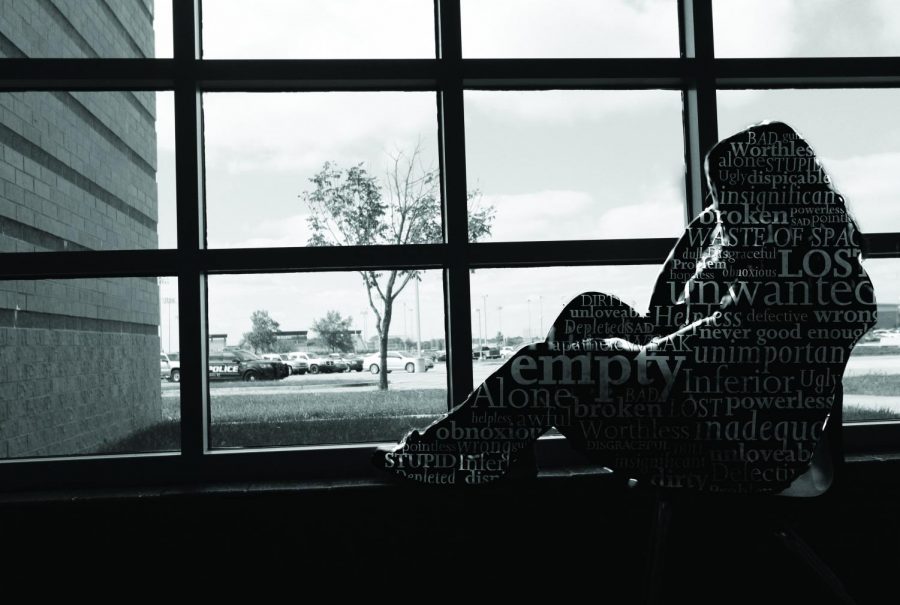Dealing with Depression
Number of teens struggling with mental health issues increases
Oct 31, 2018
2.2 million.
That’s how many teens, ages 12-17, have had at least one major depressive episode according to The National Institute of Mental Health.
Depression is a mental health disorder characterized by persistently depressed mood or loss of interest in activities, causing significant impairment in daily life.
“I’ve seen the effects, they can be devastating,” chemistry teacher Kent Muyskens said.
Three of Muyskens’s four children have been diagnosed with depression.
“Statistics say 1 in 14 usually experience depression and I would say that is probably pretty accurate here,” social worker Lindsay Douglas said.
In a survey conducted during seminar, 87.8 percent of students reported knowing a peer who is experiencing depression while 43.9 percent said they themselves have definitely suffered from depression.
According to Douglas, the reasons people develop depression can be “biological, genetics, and it can be also, our environment.”
Muyskens said he believes his eldest child’s depression is connected to the death of a close friend. However his family is unsure what triggered the depression his other children have struggled with.
The Johns Hopkins Health Review reported that “the odds of adolescents suffering from clinical depression grew by 37 percent between 2005 and 2014, according to a study by Ramin Mojtabai, a professor at Johns Hopkins Bloomberg School of Public Health.”
According to Douglas, “youth, today is under this false expectation of having to be ‘perfect’ and it’s impossible to be ‘perfect.’”
She mostly points the finger at social media platforms as the driving force behind the need for perfection.
“This generation, more than any other generation, are under 24 hour surveillance,” Douglas said. “If you are having an ‘off moment’, you kind of never know whose capturing that and posting it for the world to see, which I think is another pressure.”
Douglas said that when someone posts that video of someone else’s “off moment”, teens don’t know how people will react to the content and they develop this demeanor that “everyone is judging” them.
The school has seen an increase in students dealing with mental health issues such as depression and anxiety.
To increase awareness in both students and parents, the social workers hold evening parent panels and counselors to go into Learning Centers and talk about mental health with the students.
Additionally, USD 231 partnered with other Johnson County School Districts to launch a “community mobilization campaign to prevent teen suicide.”
According to the press release, the #ZeroReasonsWhy campaign will gather stakeholders together to with the goal of “implementing action plans, programs, events, and outreach efforts.”
“We feel strongly that by mobilizing necessary resources, disseminating information, generating support and fostering cooperation across public and private sectors in the community, we can influence the conversation and de-stigmatize the issue,” said Superintendent Pam Stranathan. “Attempted suicides have increased, and teen death by suicide has nearly doubled in Johnson County in the first six months of 2018.”
The counseling department follows an official procedure when it comes to a heightened concern for a student.
“If there is a student, teacher, parent who expresses a concern about a student who is contemplating suicide it comes to us.” Douglas said.
They will assess the risks and develop a plan, which may include a referral for treatment at a mental health organization like a nearby hospital as soon as possible, if the student is deemed at high risk.
According to Douglas, relationships are one of the most important factors in helping the depression process and treatment.
“The more relationships you have, the more meaningful your life is,” she said.
While being supportive of a friend with depression is important, Douglas warns students to not be their only counselor to reach out to, 24 hours a day. If a friend is requesting help, and you’re not available, something unexpected could happen and you’re paying the price through guilt.
“You also have to take care of yourself. There’s been too many situations and they are trying to be that professional counselor to their friend,” Douglas said. ”Tell them that you love them too much for you to just depend on my advice.”
Try to encourage the idea of talking to an adult by offering to go to the office or a therapist with them for moral support.
“I think everyone knows what it feels like to feel sad and I just want people to know that it’s okay to ask for help. It doesn’t mean anything is wrong with you,” Douglas said.






